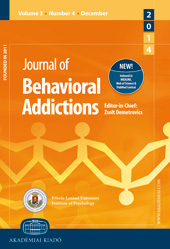Impulsive Behaviors in Patients With Pathological Buying
Impulsive Behaviors in Patients With Pathological Buying
Author(s): Heike Zander, Laurence Claes, Eva M. Voth, Astrid MüllerSubject(s): Personality Psychology, Clinical psychology, Behaviorism, Substance abuse and addiction, Socio-Economic Research
Published by: Akadémiai Kiadó
Keywords: pathological buying; impulsivity; borderline personality; self-harm; attention deficit; hyperactivity disorder; binge eating;
Summary/Abstract: To investigate impulsive behaviors in pathological buying (PB). Methods: The study included three groups matched for age and gender: treatment seeking outpatients with PB (PB+), treatment seeking psychiatric inpatients without PB (PB−), and a healthy control group (HC). PB was assessed by means of the Compulsive Buying Scale and by the impulse control disorder (ICD) module of the research version of the Structured Clinical Interview for DSM-IV (SCID-ICD). All participants answered questionnaires concerning symptoms of borderline personality disorder, selfharming behaviors, binge eating and symptoms of attention deficit and hyperactivity disorder (ADHD). In addition, comorbid ICDs were assessed using the SCID-ICD. Results: The PB+ and PB− groups did not differ with regard to borderline personality disorder or ADHD symptoms, but both groups reported significantly more symptoms than the HC group. Frequencies of self-harming behaviors did not differ between the three groups. Patients with PB were more often diagnosed with any current ICD (excluding PB) compared to those without PB and the HC group (38.7% vs. 12.9% vs. 12.9%, respectively, p=.017). Discussion: Our findings confirm prior research suggesting more impulsive behaviors in patients with and without PB compared to healthy controls. The results of the questionnaire-based assessment indicate that outpatients with PB perceive themselves equally impulsive and self-harm as frequently as inpatients without PB; but they seem to suffer more often from an ICD as assessed by means of an interview.
Journal: Journal of Behavioral Addictions
- Issue Year: 5/2016
- Issue No: 3
- Page Range: 457-464
- Page Count: 8
- Language: English

